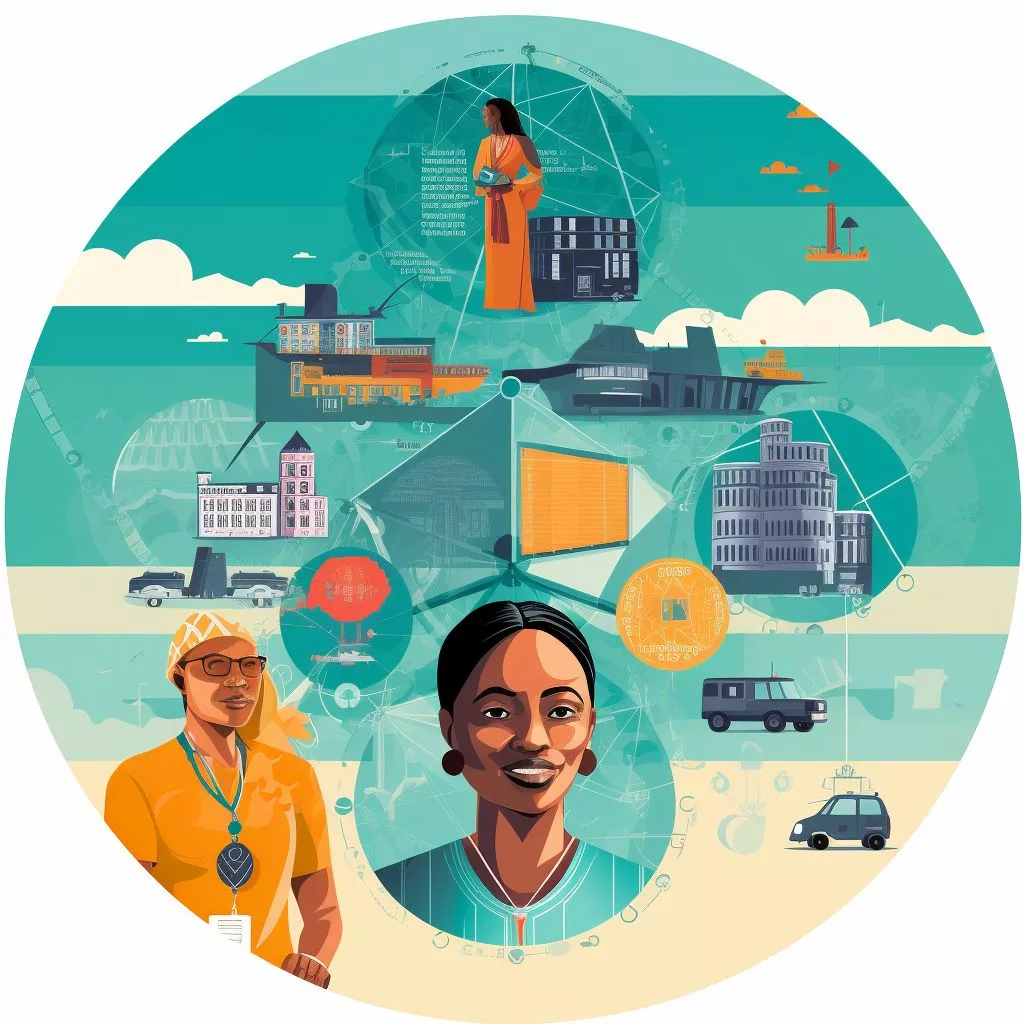The South African Primary Health Care Conference is a momentous occasion that marks a pivotal moment in the country’s health sector history. The conference is attended by a diverse blend of dignitaries, academics, researchers, NGO representatives, civil society members, and private sector individuals, all united with a shared purpose of fortifying South Africa’s primary health care. The conference addresses the challenges of achieving Universal Health Coverage, constructing an inclusive national healthcare system, and prioritizing holistic wellness through the district health system. The Minister emphasizes the importance of collaboration and commitment to a common goal – a vision of health and well-being for all, leaving no one behind.
What is Universal Health Coverage and what are its challenges in South Africa?
Universal Health Coverage is the principle of fairness and accessibility in healthcare, aiming to achieve health equality. However, South Africa’s health sector is still plagued by inequality, with private sector health expenditure escalating while public sector allocations dwindle. To confront this, the Minister proposes constructing an inclusive national healthcare system that guarantees resource availability to all, irrespective of their socio-economic circumstances, with the introduction of National Health Insurance being a crucial stride towards this goal.
A Momentous Occasion: Reflections on History and Aspirations
As autumn’s vibrant colors blanket the Eastern Cape, a noteworthy convention unfolds within the East London International Convention Centre. This is a pivotal moment in South Africa’s health sector history – the South African Primary Health Care Conference, attended by the distinguished Minister Joe Phaahla, a heavyweight in public health.
The atmosphere bursts with expectation as Minister Phaahla, a figure revered for his unwavering dedication to healthcare, takes the stage to engage the attending delegates. The audience, a diverse blend of dignitaries, academics, researchers, NGO representatives, civil society members, and private sector individuals, stand united with a shared purpose: fortifying South Africa’s primary health care.
Minister Phaahla launches his speech by emphasizing the significant strides we’ve made towards health liberation. He points out that September 2023 marks 45 years since the landmark Alma Ata Conference on Primary Health Care in Kazakhstan and the fifth anniversary of the International Primary Health Care Conference in Astana. As a signatory to the United Nations’ Sustainable Development Goals, South Africa demonstrates its key role and dedication in the global health community.
Charting the Course: Universal Health Coverage and Its Challenges
Transitioning from these historic landmarks, Minister Phaahla directs the conversation towards the immediate matter at hand – the realization of Universal Health Coverage. This concept, born out of the Alma Ata Conference’s aspirations, is integral to achieving health equality. Upholding the principles of fairness and accessibility, Universal Health Coverage represents a lifeline for many who often find themselves overlooked in terms of healthcare access.
However, this aspiration is not devoid of hurdles. The Minister concedes that the health sector is still plagued by inequality, a formidable barrier that threatens to exacerbate the disparities within the health system. The private sector’s escalating health expenditure contrasts starkly with dwindling public sector allocations, creating a worrying chasm.
To confront this problem, Minister Phaahla underscores the pressing need for a raft of reforms. The resolution, he proposes, lies in constructing an inclusive national healthcare system that guarantees resource availability to all, irrespective of their socio-economic circumstances. The introduction of National Health Insurance is a crucial stride towards this goal.
Towards Holistic Wellness: District Health System and Future Priorities
Health, as defined by the 1978 ALMA ATA DECLARATION ON PRIMARY HEALTH CARE, transcends the mere absence of illness. It is a state of total physical, mental, and social wellness. This principle guides South Africa’s government and its various stakeholders and partners in their pursuit to ensure a socially and economically productive life for all South Africans.
In this regard, the district health system plays a critical role. A complex web of services, including community health worker programs, school health programs, environmental health services, and the central chronic medicine dispensing and distribution program, ensures healthcare accessibility at various levels.
Minister Phaahla accentuates the need for a balance between clinical and supportive resources. He contends that the quality of clinical services hinges on the administrative, financial, supply chain, and information and communication services they receive, as illustrated by the role community health workers have played in the Central Chronic Medicines Dispensing and Distribution program’s success.
The Adult Primary Care Model, introduced in 2014, instructs healthcare professionals on managing various illnesses, including co-morbidities. This model embodies the government’s staunch belief in providing holistic care that caters to an individual and a family’s health needs without draining their finances or necessitating multiple clinic visits.
However, Minister Phaahla acknowledges that certain areas within the health system still require fortification. The Environmental Health Programme, for instance, is crucial for South Africans’ safety against potential environmental hazards. Increasing the number of environmental health officers appointed by municipalities is identified as a necessary measure to continue this mission.
The Minister further recognizes the potency of collaboration in achieving health goals. Joint efforts across departments, coupled with partnerships with the private sector, NGOs, academic and research institutions, civil society, and communities are vital in addressing the social determinants of health.
Health promotion and disease prevention are also key to maximizing the utilization of resources. The Minister stresses the need to concentrate on health promotion and early intervention at the primary health care level, asserting that this would relieve the country’s budget from high-cost health interventions.
South Africa reaffirms its commitment to the 2018 Astana Declaration on primary health care, pledging to enhance the capacity-building of all health cadres and a commitment to learning and sharing knowledge and experiences. The Minister restates the importance of the correct funding mechanism for health services and emphasizes the need for the implementation of the National Health Insurance.
This conference, thus, provides a platform for stakeholders to express their views, recognize strengths and weaknesses, and guide the planning and implementation of primary health care services within South Africa’s district health system.
Minister Phaahla’s address at the South African Primary Health Care Conference is more than a speech. It is a rallying call, a plea for unity, and a commitment to a common goal – a vision of health and well-being for all, leaving no one behind. While the journey towards this vision is fraught with challenges, as the Minister aptly states – together, we can and will accomplish this mission.
1. What is Universal Health Coverage and what are its challenges in South Africa?
Universal Health Coverage is a principle of fairness and accessibility in healthcare that aims to achieve health equality. However, South Africa’s health sector still faces challenges such as inequality, with private sector health expenditure increasing while public sector allocations are decreasing. The Minister proposes constructing an inclusive national healthcare system that guarantees resource availability to all, regardless of their socio-economic circumstances, with the introduction of National Health Insurance being a crucial stride towards this goal.
2. What is the South African Primary Health Care Conference?
The South African Primary Health Care Conference is a momentous occasion for South Africa’s health sector. The conference is attended by a diverse group of stakeholders, including dignitaries, academics, researchers, NGO representatives, civil society members, and private sector individuals, who are all united in their shared purpose of fortifying South Africa’s primary health care.
3. What is the district health system and why is it important?
The district health system is a complex web of services that ensures healthcare accessibility at various levels, including community health worker programs, school health programs, environmental health services, and the central chronic medicine dispensing and distribution program. It plays a critical role in South Africa’s pursuit to ensure total physical, mental, and social wellness for all South Africans.
4. What is the Adult Primary Care Model?
The Adult Primary Care Model is a model that instructs healthcare professionals on managing various illnesses, including co-morbidities. It embodies the government’s belief in providing holistic care that caters to an individual and a family’s health needs without draining their finances or necessitating multiple clinic visits.
5. Why is collaboration important in achieving health goals?
Collaboration is vital in addressing the social determinants of health. Joint efforts across departments, coupled with partnerships with the private sector, NGOs, academic and research institutions, civil society, and communities are crucial in achieving health goals.
6. What is the message conveyed by Minister Phaahla’s address at the South African Primary Health Care Conference?
Minister Phaahla’s address at the South African Primary Health Care Conference conveys a rallying call, a plea for unity, and a commitment to a common goal – a vision of health and well-being for all, leaving no one behind. The journey towards this vision is fraught with challenges, but together, stakeholders can and will accomplish this mission.








